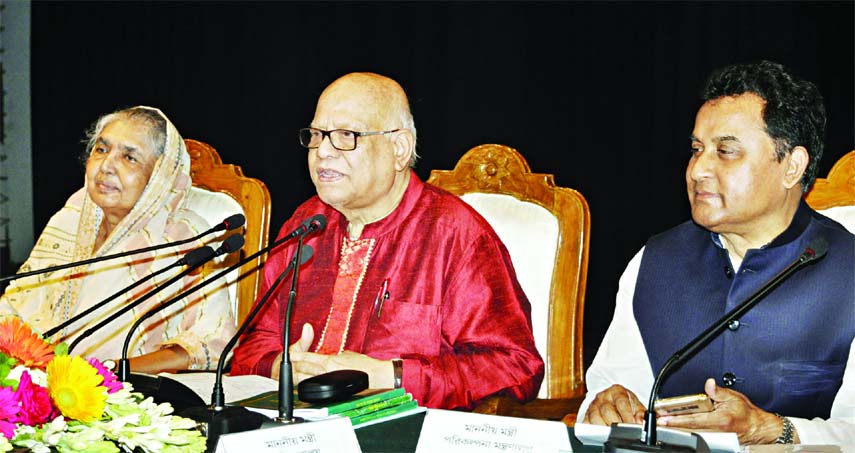
Rejecting the criticism, Finance Ninister AMA Muhith on Friday said the proposed budget for the next fiscal is implementable, as the budgetary targets have been fixed taking the country’s recent economic performance into consideration.
“Budget is an estimate of income and expenditure and when we fix the targets, we do it thoughtfully so that budgetary goals could be achieved,” he told reporters in a post-budget media briefing at the Osmani Memorial Auditorium in Dhaka.
“Yes, we face shortfalls in earnings and expenditure, but it is coming down significantly every year,” Muthith said.
The finance minister on Thursday placed Tk 4,64,573 crore national budget, the last one of the ruling Awami League (AL) government before the next Parliamentary Election, for the fiscal year 2018-19 in Jatiya Sangsad targeting an economic growth of 7.8 percent.
Terming the budget as “a whole bouquet for the country’s voting classes, economic observers expressed doubt about the implementation of the budget.
Replaying to a question, Muhith said, “All the budgets of political governments are election budget as they have to please the voting classes. Being a member of a political party I always try to present ‘populist’ budget to woo voters.”
In reply to a question, the octogenarian finance minister said, “Even though it’s the election year, the electoral atmosphere is yet to take shape in the country. But when that will happen, implementation of development projects may be hampered. Since it has not happened yet, implementation of the next budget will not be affected.”
Regarding the next fiscal’s GDP growth target Muhith said, “Bangladesh has been maintaining a high growth over the last two decades. The GDP growth is expected to hit 7.36 per cent in the current fiscal. In this context, achieving the GDP growth of 7.8 percent in the next year is possible.”
Regarding the corporate tax cut proposal, Muhith said, banking sector has been given such facility in a bid to bring down interest rate on loans to single digit.
The government made the decision following several high level meetings before the budget was announced.
He, however, admitted that corporate tax rate is high in Bangladesh compared to other nations in the world.
Replying to another question, Muhith said, he would not form banking commission to look into the recent irregularities of banking sector. “I told that a banking commission will be formed soon to bring banking reform. But it would not be formed by the end of this year. I would send the task to the next government.”
Muhith said Bangladesh is maintaining a low foreign debt amounting to US$30 billion. Even it is maintaining a good track record on debt repayment.
Regarding budget deficit, Muhith said the Bangladesh has been maintaining a low budget deficit and in the next fiscal it has been projected at 4.9 per cent of GDP.
“The deficit remains in safe zone and this is not a problem for us.”
Replying to another question Muhith said, “We gave them (government servants) enough and I hope they are highly pleased with the government’s recent pay hike.”
The minister, however, became angry when journalists raise the issue of income inequality and discrimination between poor and rich people saying the proposed budget lacks direction to reduce the inequality.
“Discrimination between poor and rich has not increased across the country. Even the percentage of poor people is not increasing, obviously it is decreasing,” he said, adding, “The percentage of poor people in the population has come down to 22.4 percent from 30 percent in last seven years.”
He raised question how the journalists could say that the proposed budget has discriminated between the poor and rich.
Planning Minister AMH Mustafa Kamal, Agriculture Minister Matia Chowdhury, Information Minister Hasanul Haq Inu, Prime Minister’s Economic and Energy advisers Dr Mashiur Rahman and Dr Tawfiq-e-Elahi Chowdhury, Member (Senior Secretary), General Economics Division (GED) of Planning Commission Dr Shamsul Alam, NBR Chairman (Senior Secretary) Md. Mosharraf Hossain Bhuiyan, Finance Secretary Mohammad Muslim Chowdhury, ERD Secretary Kazi Shofiqul Azam
Secretary and Bangladesh Bank Governor Dr Fazle Kabir also spoke at the brifing.

